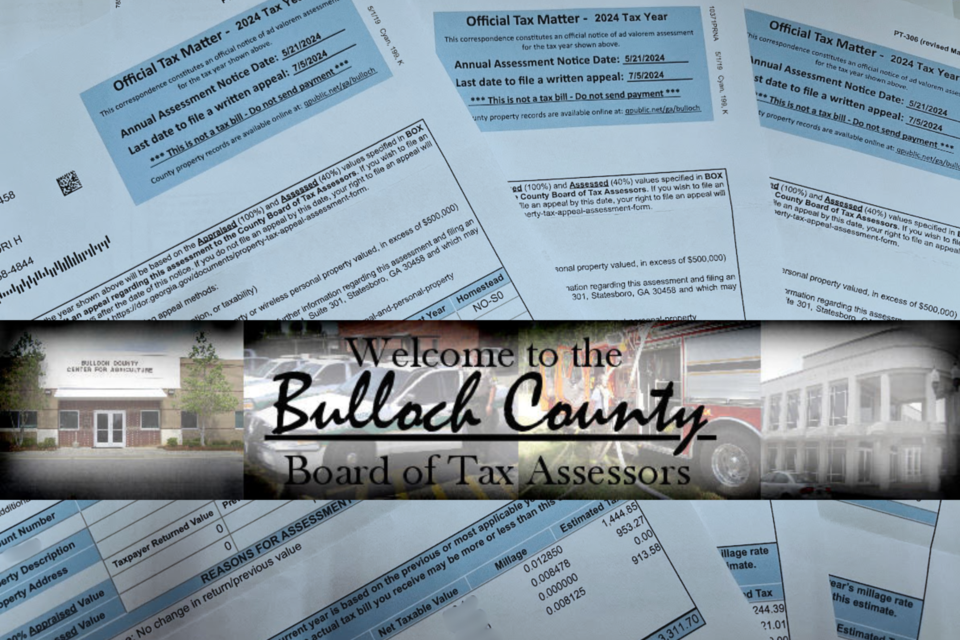The Bulloch County Tax Assessors office recently sent out their annual property tax valuations to Bulloch County property owners, and thanks to the continue rise in real estate sales prices, many are seeing double digit percentage increases in their property values again this year. These valuations determine how much property owners pay in tax at the end of the year in City, County, school, and personal property taxes.
- Keep in mind that the annual assessment estimated tax is NOT just the County tax. It is the combined estimated tax for COUNTY, SCHOOL and CITY.
- The estimated taxes on the assessment notice are NOT correct. The County commissioners have already stated their intent for a roll back of at least 1 mil.
According to Robert Fisher, Deputy Chief Appraiser for Bulloch County, the total County tax digest increased by almost 17% or $500 million.
76% of residential properties values have increased less than 20%. 50% have seen their values increase less than 12%.
Commercial properties varies based on type of commercial property and location of the property.
Fisher discussed how the assessors office works hard to be as fair and accurate as possible with assessments. They never use speculative data. They base their assessments on actual sales data to give an accurate reflection of market conditions.
“We are all property owners in Bulloch County, and we feel at the end of the day our goal is to put the fair and equitable value on property for everyone; that is the goal we want to reach,” said Robert Fisher.
With the continued rapid growth, high housing demand with low housing inventory, it is evident that the market values are only going to increase.
Fisher wants to remind citizens of some key point regarding property tax value assessments:
- The Board of Assessors is independent of the county Commissioners. The Commissioners have no say in property values.
- The Assessors offices is responsible for the valuation of all property in the county. We are governed by state law specifically ocga 48-5.
- Values are based solely on market conditions (what property is being bought and sold for in Bulloch County)
- The estimated taxes on the assessment notice are NOT correct. The County commissioners have already stated their intent for a roll back of at least 1 mil.
- Many people will have a higher tax bill regardless because of the loss of the governors tax credit received last year that savings ranged from $300 to over $500 depending on your tax district.
- If you disagree with your value feel free to contact the assessors office to discuss how your value was developed and talk specifically about your property valuation. There is no risk of increase by talking to us your notice value is the highest it can be.
- You cannot appeal the taxes. They are not set by the assessors. Questions about mileage rates should be directed to the taxing authorities the county commission, city council if applicable and school board.
- You can appeal the the fair market value of the assessment (keep reading for appeal instructions)

$500 Million of Tax Digest Growth - again
In 2022, the net digest for Bulloch County was $2.5 billion. In 2023, that number increased to over $3 billion. The 2024 net digest is around $3.5 billion.
The percentage increase from 2021 to 2022 was 9%. We saw that number double in 2023 and 2024.
Annually, there are typically over 1,000 residential properties sold versus under 70 commercial property sales.
Millage Rates
In addition to the valuation increase, the City of Statesboro has a proposed budget based on a 1 mil increase and Bulloch County has proposed a roll back which should offset the property valuation increase for most citizens. Bulloch County Board of Education have began budget meetings as well, but are working to see a budget that does not require a tax increase.
Farm land impact
With the high level of interest in agriculture property being sold for industrial or residential development, many citizens are concerned what impact this will have on farmland. Fisher said that over 76% of farmland in Bulloch County is placed in the Conservation Use Valuation Assessment (CUVA) program, which makes them immune to these increases. In the program, they can only increase 3% per year per state law.
Leading the nation in property value growth
A Washington Post story with an interactive map showing housing price changes from 2022 to 2023 shows that Bulloch County led the nation again with some of the highest increases in market pricing. The average home price in Bulloch County now is $264.6K.
Since March of 2022, home prices in Statesboro have risen by 13.6%.
Taxpayer Bill of Rights
The Georgia Taxpayer’s Bill of Rights allows for the prevention of indirect tax increases resulting from increases to existing property values in a county due to inflation.
Each year, there are two types of value increases made to a county tax digest:
- increases due to inflation, and
- increases due to new or improved properties.
There are no additional requirements if the levying authority rolls back the millage rate each year to offset any inflationary increases in the digest. If it does not, a local levying authority must notify the public that taxes are being increased.
HOMESTEAD EXEMPTION
Several types of homestead exemptions have been enacted to reduce the burden of ad valorem taxation for Georgia homeowners. These exemptions apply to homestead property owned by a taxpayer and occupied as his or her legal residence.
Homestead exemptions may be filed for any time during the year. However, exemptions must be filed by April 1 to apply to the current tax year. You must still own and occupy the property as of January 1 to be eligible.
- Standard Homestead Exemption
The Home of each resident of Georgia that is actually occupied and used as the primary residence by the owner may be granted a $2,000 exemption from state, county and school taxes except for school taxes levied by municipalities and except to pay interest on and to retire bonded indebtedness. The $2,000 is deducted from the 40% assessed value of the homestead. The owner of a dwelling house of a farm that is granted homestead exemption may also claim a homestead exemption in participation with the program of rural housing under contract with the local housing authority. (O.C.G.A 48-5-44) - Individuals 65 Years of Age and Older May Claim a $4,000 Exemption
Individuals 65 years of age or over may claim a $4,000 exemption from all state and county ad valorem taxes if the income of that person and his spouse does not exceed $10,000 for the prior year. Income from retirement sources, pensions, and disability income is excluded up to the maximum amount allowed to be paid to an individual and his spouse under the federal Social Security Act. The social security maximum benefit for 2019 is $68,664. The owner must notify the tax assessors office if for any reason they no longer meet the requirements for this exemption. (O.C.G.A. 48-5-47) - Individuals 62 Years of Age and Older May Claim an Additional Exemption
Individuals 62 years of age or over that are residents of each independent school district may claim an additional exemption from all ad valorem taxes for educational purposes and to retire school bond indebtedness if the income of that person and his spouse does not exceed $10,000 for the prior year. Income from retirement sources, pensions, and disability income is excluded up to the maximum amount allowed to be paid to an individual and his spouse under the federal Social Security Act. The social security maximum benefit for 2019 is $68,664. The owner must notify the tax assessors office if for any reason they no longer meet the requirements for this exemption. This exemption may not exceed $10,000 of the homestead's assessed value. (O.C.G.A. 48-5-52) - Homestead Exemption for Disabled Veterans
Any qualifying disabled veteran may be granted an exemption of $60,000 plus an additional sum from paying property taxes for county, municipal, and school purposes. The additional sum is determined according to an index rate set by United States Secretary of Veterans Affairs. The amount for 2019 is $85,645. The value of the property in excess of this exemption remains taxable. This exemption is extended to the unremarried surviving spouse or minor children as long as they continue to occupy the home as a residence. (O.C.G.A. § 48-5-48) - Surviving Spouse of U.S. Service Member
The unremarried surviving spouse of a member of the armed forces who was killed in or died as a result of any war or armed conflict will be granted a homestead exemption from all ad valorem taxes for county, municipal and school purposes in the amount of $60,000 plus an additional sum. The additional sum is determined according to an index rate set by United States Secretary of Veterans Affairs. The amount for 2019 is $85,645. The surviving spouse will continue to be eligible for the exemption as long as they do not remarry. (O.C.G.A. § 48-5-52.1)
To access the Homestead Exemption Application CLICK HERE.
Fill in the form; print and mail or save and email to [email protected]
Along with the application, send a copy of Proof of Residency (Driver's License, Car Registration, or Voter's Registration).
Appeals
The Bulloch County Board of Tax Assessors do not accept appeals by email.
Appeals faxed must be received in the office by 5:00 PM on the last day of the Appeal Period.
Bulloch County Tax Assessors
P O Box 1421
Statesboro, GA 30459
ASSESSMENT APPEALS
When the Board of Tax Assessors changes the value of property from the value in place for the preceding year or from the value that was returned by the taxpayer for the current year, a notice of change must be sent to the property owner. Upon receipt of this notice, the property owner desiring to appeal the change in value must do so within 45 days of the date of the notice. The appeal is filed with the Board of Tax Assessors, which reviews the appeal filed and informs the taxpayer of its decision. If the Board of Tax Assessors makes no changes, the appeal is automatically forwarded to the County Board of Equalization. A hearing is scheduled, conducted and the Board of Equalization renders its decision. If the taxpayer is still dissatisfied with the decision, an appeal to Superior Court may be made.
In lieu of an administrative appeal with the Board of Equalization, an arbitration method of appeal is also available to the taxpayer. The Board of Tax Assessors can provide details regarding this procedure.
The assessment appeal may be made on the basis of taxability of the property, the value placed upon the property, or the uniformity of that value when compared to other similar properties in the county. The appeal must be filed within the applicable time period and cannot be filed after that time. Additionally, the appeal should not be based on any complaint regarding the amount of taxes levied on the property.
For more information on the Appeals Process please go to: https://dor.georgia.gov/property-tax-appeals




